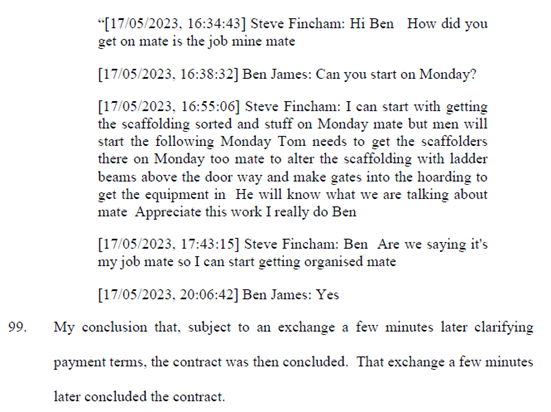In the recent case of Jaevee Homes Limited (“Jaevee”) v Mr Steve Fincham (t/a Fincham Demolition) (“Fincham”) [2025] EWHC 942 (TCC), the High Court confirmed an Adjudicator’s Decision that WhatsApp messages constituted a construction contract, and invoices submitted with reference to them were therefore valid payment notices.
Background and analysis
The dispute was regarding demolition works at a former Norwich nightclub. Jaevee Homes, a property developer, and Steve Fincham, a contract demolisher, disagreed over unpaid sums. A quotation totalling £248,000 for the demolition works was agreed, with monthly application payment terms of 28 to 30 days following invoice. The Adjudicator’s Decision was in Fincham’s favour, whereby Jaevee was to pay the sum of four unpaid invoices, interest and the Adjudicator’s fees, totalling almost £146,000. The adjudicator decided that the invoices were valid payment applications, therefore they should have been paid by the final date for payment.
Jaevee, however, did not pay following the adjudication, prompting Fincham to start proceedings in the Technology and Construction Court (TCC), a branch of the High Court, to enforce the Decision. Jaevee filed a Part 8 counterclaim seeking declarations that the original findings of fact were wrong. In short, Fincham argued that the contract was agreed on 17 May 2023 via WhatsApp, following an exchange of both emails and WhatsApp messages. Jaevee contended that the contract was concluded later by a formalised written agreement on or around 26 May 2023, when a sub-contract and purchase order was emailed to Fincham. Neither was acknowledged or signed by Fincham.
Deputy High Court Judge Roger Ter Haar KC ruled that:
- the contract was concluded over WhatsApp and that as the formal sub-contract had not been agreed or accepted, its terms were not incorporated including the additional payment requirements.
- after adopting a ‘commonsense’ view regarding the disputed invoices, three of the four invoices were valid. One of the invoices was found to be invalid due to it falling outside of the agreed monthly application payment terms.
At paragraph 81 of the 54 page judgment, the judge’s findings were clear:
“In my judgment, the exchange of WhatsApp messages, whilst informal, evidenced and constituted a concluded contract.”
At paragraphs 98 and 99 there is a useful excerpt of the key WhatsApp exchanges that were examined by the Court:

Conclusion
- If you are in the throes of negotiating terms, or you are about to draw up and sign a written contract, make sure emails are marked subject to contract. This means it is less likely for parties to misinterpret or misunderstand the stage of the negotiations, and makes clear that you have not yet entered into a legally binding contract. It is particularly important if you are proposing to vary or amend the terms of an agreement, especially those relating to payment. However it is equally important to follow through and ensure that a formal written agreement is executed following negotiations.
- Be mindful of informal messages, including ad hoc messages and verbal statements. They have the potential to bind parties for considerable sums of money. Even the most straightforward contract queries from a party can have unforeseen consequences.
- The Courts have the ability to analyse informal and often fast paced contracts in the construction industry. In this case, in addition to applying legal statute, the Court effectively examined both the wording and timing of the messages, in order to determine the incorporated contractual terms.
A link to the full judgement can be found here.
At Herrington Carmichael LLP, our construction team advises project clients, main and sub-contractors, on a range of disputes including claims for non-payment and defects. If you would like to discuss construction contracts or any of the topics highlighted in this article, please contact us to speak to a member of our Construction Team.








